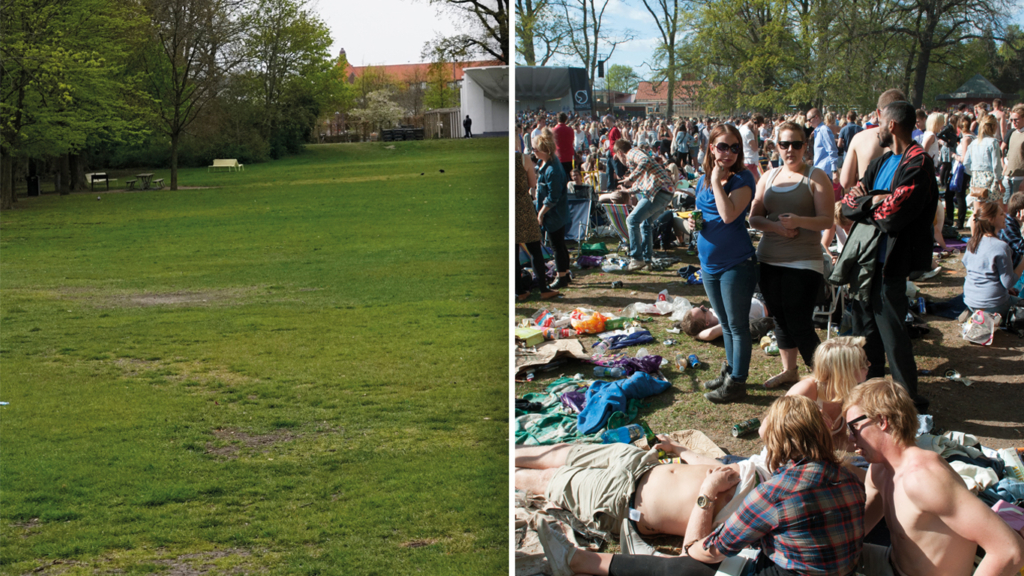For the second year in a row the Walpurgis night: Siste April (30th April) celebrations are cancelled. No gatherings will be taking place in the public parks due to Covid-19 restrictions. Time to stay home, yet again.
Every year Walpurgis, or Siste april in Lund gathers 25 000- 30 000 visitors from all over the country, but Lund’s Municipality wants us all to think about the current situation of Covid-19, and to avoid large gatherings and trips for the celebrations. The cancellation was already announced in January. This year, however, we might avoid the chicken manure that was spread out over the city park last year to prevent gatherings. With the pandemic law not allowing large gatherings, the police will be able to hold people accountable.
What will it mean for future celebrations, when traditional events such as these – get cancelled? Will people forget the meaning of the tradition? Will the importance of celebrating Siste April become irrelevant? Lundagård asked Steven Sampson, a professor emeritus at the Department of Social Anthropology at Lund University, to give some insight on what might occur in Sweden if our major traditions ceased to be celebrated. A short, and comforting, the answer is, ‘Don’t worry, Swedish people will not be very affected.’
According to Steven Sampson, Sweden has had the ‘privilege’ of not experiencing the kind of Covid-19 restrictions that most countries, such as the UK and Denmark have had. We have not experienced a lockdown, a shutdown of restaurants, stores, gyms, etcetera. For most people, our everyday activities have remained quite similar to what we did before. We still fika, we can get a glass of wine at a café, and we can celebrate ‘fettisdagen’.
Our small, everyday rituals, whether it be with friends or family, have remained intact. One can still go to the pub to “talk shit” as Steven Sampson puts it. In Denmark, where he lives, people have not been in a restaurant, a café, a gym, or gotten a haircut for nearly a year!
Of course, there are exceptions such as elders at care centres not allowed out, people who are part of high-risk groups, and then there are the over 13,000 Swedes who have died, by far the highest amount in Scandinavia. So, some of us have not been so lucky, it may only be when grief occurs that the recommendations are taken more seriously. Nevertheless, the nostalgia of traditions, big or small, will be smaller for Swedes, since we have been able to normally go about more or less without having our everyday rituals “sacrificed”, nor have we suffered the strict restrictions imposed on us.
Sampson explains that it is the small rituals that really matter: family dinners, fika, birthdays, etcetera. Siste april will come again, and when it does, it will most likely be celebrated as it has been in the past. But we should watch how the small rituals may be the ones that change, as they have already done with digitalization. Not to mention who we will shake hands with or hug in the future.
Jakob Löfgren, a PhD in folkloristics at Lund University, explains that when Siste april is cancelled, people tend to remember the most platonic and essential feelings and events. ‘Nobody remembers the weather last year,’ says Jakob Löfgren. Instead, we remember the ‘perfect’ Siste april celebration. Jakob Löfgren states that ‘the cancellation almost becomes a ritual sacrifice of the student body. The cancellation is embedded with symbolic value as it’s a direct effect of the pandemic. Nonetheless, like Steven Sampson, Jakob Löfgren states that there is no doubt that Siste april will continue, as it is a long-standing embedded tradition in University life. If anything, the cancellation may lead to an even bigger mass when the good times return.
‘It is only when recommended restrictions are lifted,’ Jakob Löfgren explains, that ‘we can see what people marked as important, regarding social activities.’ Like any country, we use specific dates to mark important events or celebrations during the year. Even the government has ‘marked’ Midsummer as important, this is the day when the entire population will be vaccinated (they say). Traditions matter and they will continue to matter during a pandemic. People and governments will strive for normality again. We will most likely try to forget this pandemic and put it behind us as done with the previous pandemics in history. Perhaps celebrating Siste april next year can help us forget what this year was like.









